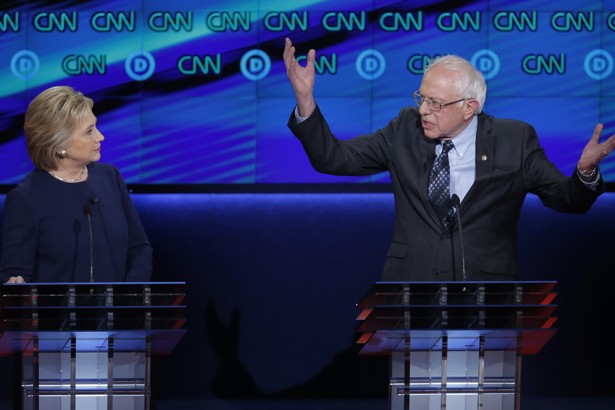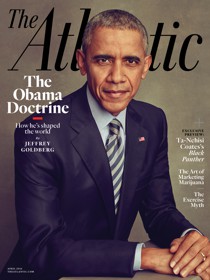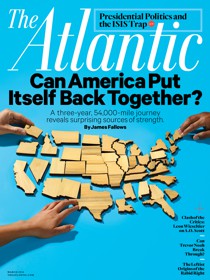New Yorkers are a blunt and confrontational bunch, so it’s only appropriate that as the presidential campaign heads to the Empire State—birthplace of Bernie Sanders and adopted home of Hillary Clinton—ahead of the April 19 primary, the Democratic race is getting a little chippy.
Speaking in Philadelphia on Wednesday, Sanders unloaded on Clinton, arguing she is unqualified to be president (and then sending out the remarks to reporters in a press release):
I don’t believe that she is qualified if she is through her super PAC taking tens of millions of dollars in special-interest funds.
I don’t think that you are qualified if you get $15 million from Wall Street through your super PAC.
I don’t think you are qualified if you voted for the disastrous war in Iraq.
I don’t think you’re qualified if you supported almost every disastrous trade agreement.
I don’t think you are qualified if you supported the Panama free trade agreement, something I very strongly opposed, which has gave the green light to wealthy people and corporations all over the world to avoid paying taxes owed to their countries.
The first thing to say about these remarks is that the escalation is almost entirely semantic, rather than material. All of the attacks that Sanders leveled here—Clinton’s support for free trade, backing for the war in Iraq, and coziness with Wall Street, and dependence on big donors—are things he’s talked about for months now.
Sanders cast his remarks as simple turnabout. “Secretary Clinton appears to be getting a little nervous,” he said. “She has been saying lately that I am not qualified to be president.”
The Vermonter appears to be referring to an interview Clinton did with MSNBC’s Morning Joe, in which she criticized Sanders for his vague answers in a meeting with the New York Daily News editorial board. The Clinton campaign has leapt on that interview with the News, even sending out the full transcript as a fundraising email. (Sanders’s defenders continue to insist, contra the transcript, that he was crystal clear.) In the TV interview, Joe Scarborough tried three times to get Clinton to say that she didn’t think Sanders was qualified.
Here’s her first answer:
I think the interview raised a lot of really serious questions. I look at this way: The core of his campaign has been ‘break up the banks,’ and it didn’t seem in reading his answers that he understood exactly how that would work under Dodd-Frank…
Her second:
I think he hadn’t done his homework, and he’d been talking for more than a year about doing things he obviously hadn’t really studied understood. That does raise a lot of questions.
And her third:
I think that what he has been saying about the core issue in his whole campaign doesn’t seem to be rooted in an understanding of either the law or the practical ways you get something done. And I will leave it to voters to decide who of us can do the job that the country needs, who can do all aspects of the job.
It’s classic Clinton: She’s cautious, careful, and stays on message. And the “qualified” broadside is classic Sanders too. He’s angry, and he’s not afraid to show that. This directness—and its contrast with the impression that Clinton is calculating—is one of the forces that has powered Sanders’s campaign.
He may have overdone it in this case. There’s a certain logic to attacking Clinton’s qualifications, since her campaign is built not on charismatic appeal so much as her experience and resume: Attack the strengths, not the weaknesses. But this sort of attack will only motivate and energize her own voters, who won’t hear it as a commentary on Iraq so much as a personal slam. Besides, Sanders has said in the past that he would support Clinton if she were the nominee, a stance his campaign manager affirmed Thursday. Clinton, meanwhile, seemed delighted to be able to take the high road. “I don't know why he's saying that but I will take Bernie Sanders over Ted Cruz or Donald Trump any time,” she said Thursday morning.
ABC’s Rick Klein argues that “qualified” is a Rubicon—it’s pretty hard to go back and endorse someone you’ve said is unqualified. Maybe, though candidates have walked back stronger statements, and they’ll continue to do so. Sanders’s campaign seems to already be backing off his comments. Even if he walks them back, you can be assured they’ll return in the general election if Clinton is the Democratic nominee.
Regardless, some perspective on the “qualified” fight is in order. Remember the 2008 Democratic primary? Remember “You’re likable enough, Hillary”? Remember the 3 a.m. phone call? Remember Clinton defending her decision to stay in the race into June by citing Robert Kennedy’s assassination? And those are just the public comments. The acrimony inside the the Clinton camp was much worse. One reason this brouhaha is getting so much attention is that the Democratic campaign has been a much friendlier affair in 2016.







